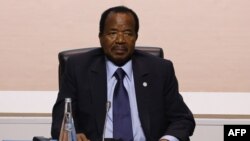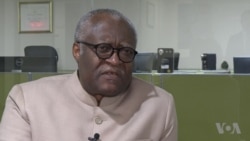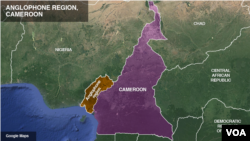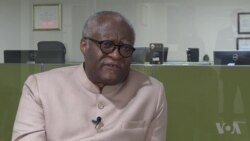It has been 18 years since Akere Muna founded the Cameroon chapter of Transparency International, the anti-corruption watchdog agency. And although the organization has scored some successes, the overall picture is not improving. In 2017, Cameroon slipped to 153rd out of 180 countries in TI’s annual corruption perception index, a slight drop from their ranking the previous year.
So Muna has decided to set his sights higher. In the October election, he will run against President Paul Biya, who has held power in the West African country for more than three decades. And although the 65-year-old lawyer knows challenging the powerful incumbent carries risks, he is ready for them.
“I know that I’m considered as being a threat to the current system,” Muna told VOA. “But I think that, you know, one has a choice of being a silent accomplice or an active actor for change, so I’ve chosen my side.”
Biya last won re-election in 2011 with 78 percent of the vote and is considered the overwhelming favorite in the upcoming election. In 2009, Cameroon’s parliament voted to lift term limits. Biya has held power since 1982, making him Africa’s second-longest serving president behind Teodoro Obiang Nguema Mbasogo of Equatorial Guinea.
Anti-corruption platform
But Muna believes he has found an issue people will rally behind: fighting corruption. Corruption is so endemic in Cameroon, Muna said, that a patient suffering a serious injury, such as a snake bite, can expect to be asked for a bribe just to receive treatment at a hospital.
Nationwide, corruption affects three main sectors: education, health and justice.
“These are the sectors that hit the poorest of the poor, and that is sad,” Muna said. “But, of course, if you go upstream in other areas you find out that the delivery of government service is very, very much destroyed by the rising tide of corruption.”
Cameroon is not alone in facing the scourge of corruption. Muna, who participated in the U.N.’s High Level Panel on Illicit Financial Flows, said $50 billion leaves the African continent illegally each year.
“The embezzlement, the thievery of government funds is really at a scale that is now a systemic problem,” he said.
Hans De Marie Heungoup, a Cameroon analyst for the International Crisis Group, said most voters believe the election is a foregone conclusion and will register in the last week, if they vote at all. The question is not who wins, but which challenger, the Social Democratic Front or another opposition group, emerges as the most viable challenger to the ruling party.
Even the issue of corruption will not be enough to galvanize voters, according to Heungoup.
“There is kind of a resignation of Cameroonians,” he said. “Very few among the ordinary Cameroonians will really think there is a candidate who will be able to curb or to eradicate corruption as it has been so entrenched in the society totally from the political leadership. And even in the normal interactions corruption has become a way of life.”
Calls for secession
Cameroon faces other challenges. Protests by the English-speaking minority have led to violent clashes with government forces. The group is now pushing for secession and calling for the creation of a new state, Ambazonia.
Muna believes much of this anger stems from people not feeling represented by their government and believing their voices will only be heard through violence. He hopes these people will get behind his candidacy to bring about change peacefully.
“I’m saying that the problem is with the government of our country, so we should change the government and not the country,” he said. “I’m pushing for that — for the ballot and not for the bullet.”
Heungoup said some in the Anglophone region of Cameroon resent the fact that Muna, who is a native of that region, is participating in the election at all. They believe his candidacy legitimizes the elections in the eyes of the international community.
“They have vowed by all means to stop and prevent elections in the Anglophone side. Now let us see if they will be able to put their words in practice,” Heungoup said.









